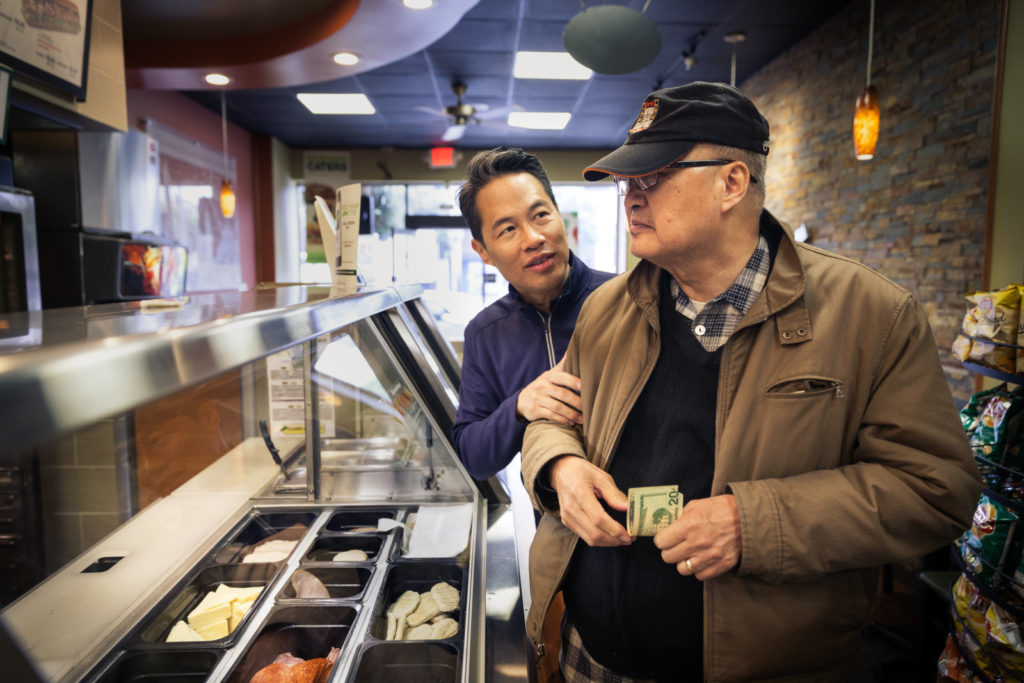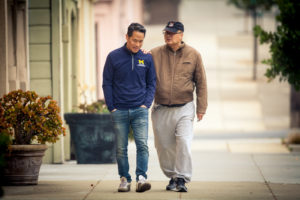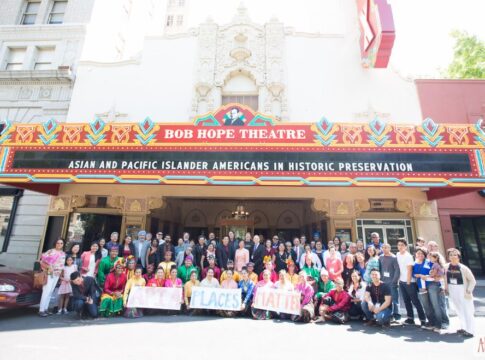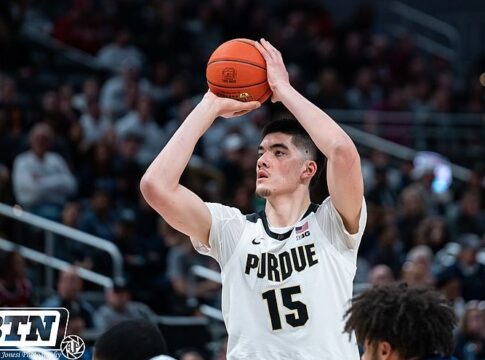
By Brittney Le
AsAmNews Staff Writer
Every week, MSNBC news anchor Richard Lui flies all the way from New York to California. Then he’ll make the return trip back just 3 or 4 days later. With 300,000 flyer miles last year, he’s flown the equivalent of 25 times around the world in the last 2 years. But the trip is worth it, as he does it for his family—he does it to take care of his father, who has Alzheimer’s Disease.
In Enduring Together: Asian Americans and Alzheimer’s Disease, Lui shares his own experiences as caregiver for his father with Alzheimer’s. “The idea was, if you want to be in broadcast news, you need to not be asking to be on TV less,” Lui told AsAmNews. And in order to go home to his family every week to help take care of his father, he had to ask to be on TV less.
When asked about whether it was hard for his family to come to terms with the diagnosis years ago, he said, “Humans just don’t like this stuff. They don’t like sickness…Some folks aren’t ready for it—I get it.” While Lui, his siblings, and his mom are at a stage where caring for his father is a normal part of family life, recognition and acceptance of dementia and Alzheimer’s remain difficult for many Asian American families.
LATEST STORIES
This month AARP is featuring heartfelt caregiving stories in honor of Caregiving Month. Enduring Together: Asian Americans and Alzheimer’s Disease, kicked off the series.
“As our AAPI population continues to age and as the number of AAPIs with dementia/Alzheimer’s increases, we want to be able to help and prepare people by identifying and steering them to resources especially resources that are culturally relevant,” stated Daphne Kwok, AARP Vice President of Multicultural Leadership, Asian American and Pacific Islander Audiences. “With these powerful personal AAPI caregiving stories, we hope they will serve as a catalyst, to provide families the courage and impetus, to start the very difficult but vitally necessary preparing to care conversations.”
One caregiver featured is Mrs. Yau. She longs for the husband she once knew, but he no longer remembers her as his wife. Mr. Yau has a doctorate in physics. He also has Alzheimer’s.
“I’m very, very, very sad that I miss him,” said Mrs. Yau. “That’s because you can see such a talented person can turn into something with a mind of a 2-3 year old. ”
She has become a 24 hour caretaker with “no life at all,” but she finds comfort in the support she receives from CaringKind.
“Mr. Yau attends the Chinese Outreach activities with Mrs. Yau, such as ALZ Café, family trips and Lunar New Year celebrations,” said Weijing Shi, CaringKind’s Manager of Chinese Outreach. “He is a very interesting person, very gentle and friendly. Although he often does not recognize everyone, but he is always smiling and greets everyone.”
CaringKind works hard to effectively address the diversity in New York City. The organization has dedicated support groups and staff to serve the local AAPI population, which can present obstacles. “Language is definitely a huge barrier in the community and so is how the disease is perceived in the culture,” said Jed Levine, Executive Vice President, Director of Programs and Services at CaringKind. “People do not speak about it or seek help, there is a lot of shame. Our dedicated staff understands the barriers and works directly in the community to help serve people.”
Another service provider with services for the AAPI community is Alzheimer’s Greater Los Angeles. ALZGLA provides services and resources in multiple languages and partners with local organizations that serve different API populations to provide support, education, and outreach. It also has an API Dementia Care Network.
“Alzheimer’s and dementia has impacted all sides of my family,” said Kelly Honda, Public Policy Manager at Alzheimer’s Greater Los Angeles (ALZGLA). “My family members have reacted differently to the diseases, which highlights the needs for different services and types of support.”
Alzheimer’s disease disproportionately impacts populations of color (older African Americans are 2x more likely than older Whites, and Hispanics are 1.5 x more likely). Honda says more research and evidence is needed to show the prevalence in the API community.
“It’s important to highlight this disease from an Asian American perspective because there is a lack of awareness and education,” said Honda. “There is also a stigma in many of our cultures, that keep us from talking about the disease and reaching out for help. Alzheimer’s is not a normal part of aging, and we need to make sure that our diverse communities get access to culturally sensitive services and support—which can’t happen without awareness and education about the disease.”
Lui has used his high profile as a news anchor to be a strong advocate for raising awareness in the Asian Pacific Islander community about Alzheimer’s.

He also has gotten closer to both his parents through being a caregiver for his father. He’s characterized his experience by two priorities: (1) Help your family, and (2) Take care of yourself. Flying between New York and California every week to help take care of his father, Lui’s lifestyle reflects the intense commitment that caregiving can be. When I mentioned to Lui how endearing he sounded when describing his father, he told me, “We all want to be that way to find the positivity…Being happy is not 100% happiness.” What is 100% is Lui’s love for his family.
Find out more about caregiving at AARP, CaringKind, ALZGLA and the Alzheimer’s Association. For more specific AAPI information you can go here. A “Prepare to Care” workbook can be downloaded here to help guide you (available in English, Chinese, and Spanish).
Visit the AARP AAPI Community Facebook page to read more stories about caregiving experiences in the Asian American Pacific Islander community.
AsAmNews has Asian America in its heart. We’re an all-volunteer effort of dedicated staff and interns. You can show your support by liking our Facebook page at www.facebook.com/asamnews, following us on Twitter, sharing our stories, interning or joining our staff.







